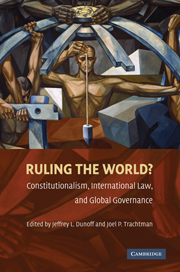Book contents
- Frontmatter
- Contents
- Contributors
- Preface: International Institutions: Why Constitutionalize?
- Acknowledgments
- PART I WHAT IS CONSTITUTIONALIZATION BEYOND THE STATE?
- PART II THE CONSTITUTIONAL DIMENSIONS OF SPECIFIC INTERNATIONAL REGIMES
- 4 The UN Charter – A Global Constitution?
- 5 Rediscovering a Forgotten Constitution: Notes on the Place of the UN Charter in the International Legal Order
- 6 Reframing EU Constitutionalism
- 7 The Politics of International Constitutions: The Curious Case of the World Trade Organization
- 8 Constitutional Economics of the World Trade Organization
- PART III CROSSCUTTING ISSUES
- Index
- References
8 - Constitutional Economics of the World Trade Organization
Published online by Cambridge University Press: 05 June 2012
- Frontmatter
- Contents
- Contributors
- Preface: International Institutions: Why Constitutionalize?
- Acknowledgments
- PART I WHAT IS CONSTITUTIONALIZATION BEYOND THE STATE?
- PART II THE CONSTITUTIONAL DIMENSIONS OF SPECIFIC INTERNATIONAL REGIMES
- 4 The UN Charter – A Global Constitution?
- 5 Rediscovering a Forgotten Constitution: Notes on the Place of the UN Charter in the International Legal Order
- 6 Reframing EU Constitutionalism
- 7 The Politics of International Constitutions: The Curious Case of the World Trade Organization
- 8 Constitutional Economics of the World Trade Organization
- PART III CROSSCUTTING ISSUES
- Index
- References
Summary
This chapter examines the World Trade Organization (WTO) from the social scientific perspective of constitutional economics. This chapter thus seeks to identify the causes and consequences of constitutionalization. Assuming that states act with intentionality and accuracy in their establishment of organizational features, the cause of constitutionalization is the desire to effect the consequences of constitutionalization, so the focus here is on the potential consequences of constitutionalization in and in connection with the WTO.
The WTO in the World
The constitutional aspects and context of the WTO cannot be examined without laying out first the factual setting in which the WTO exists and operates. This section will locate the WTO within the process of globalization and regulation.
Globalization
For a number of years, the WTO has served as a lightning rod for criticism of globalization, and many concerns regarding globalization are expressed in terms of the adequacy of the structure and function of the WTO: of both its process and its results. This identification of globalization with the WTO seems correct, insofar as the WTO is an instrument of globalization, where globalization is defined as increasing international economic integration. Of course, the WTO is not the only instrument of globalization, and the WTO even limits international economic integration in important ways, so a more nuanced perspective must examine the WTO within a broader context.
- Type
- Chapter
- Information
- Ruling the World?Constitutionalism, International Law, and Global Governance, pp. 206 - 230Publisher: Cambridge University PressPrint publication year: 2009
References
- 28
- Cited by



